
Clinton wins Pennsylvania primary
PHILADELPHIA, Pennsylvania -- U.S. Senator Hillary Clinton claimed
victory in Pennsylvania over Democratic rival Sen. Barack Obama, saying
the road to 1600 Pennsylvania Road -- the address for the White House --
"runs right through the heart of Pennsylvania."
With 80 percent of Pennsylvania precincts reporting, Clinton was
leading Obama 55 to 45 percent. A total of 158 delegates to the national
convention were at stake. A loss on Tuesday could have spelled an end to
Clinton's campaign.
Obama leads in overall votes, states won and pledged delegates. And
unless "the wheels come off his wagon," Obama was likely to hold that
lead, said David Gergen, a former adviser to both Republican and
Democratic candidates.
 In the roughly two hours after her victory became apparent, Clinton's
campaign said it received $2.5 million, with 80 percent of that money
coming from new donors. It's our best night ever," the campaign said. In the roughly two hours after her victory became apparent, Clinton's
campaign said it received $2.5 million, with 80 percent of that money
coming from new donors. It's our best night ever," the campaign said.
In her victory speech, Clinton, who represents New York, acknowledged
her fundraising deficit. Heading into the Pennsylvania primary, Obama's
campaign had roughly $40 million on hand, compared to Clinton's $8
million.
The Illinois senator had also outspent Clinton more than 2-to-1 in
Pennsylvania. Obama congratulated Clinton on her win and said his
campaign closed what had been a huge margin in her favor.
"There were a lot of folks who didn't think we could make this a race
when it started," he said at a campaign rally in Evansville, Indiana,
where Democrats will go to the polls May 6. "They thought we were going
to get blown out. But we worked hard and traveled across the state, to
big cities and small towns, to factories and VFW halls and now, six
weeks later, we closed that gap."
Clinton's win adds to those in other big states, like Ohio, New York
and California and, according to her campaign, should revive questions
about whether Obama can beat presumptive Republican nominee John McCain
in November.
Polls closed at 8 p.m. local time (0000 GMT) after what election
officials in Pennsylvania's largest cities called a solid but not
record-breaking turnout.
Heading into the primary, Clinton led Obama in published polls by
nearly 20 points, but Obama closed the gap to have a competitive showing
and outspent her by more than 2-to-1 in the process.
The last week of campaigning included a tough debate between Obama
and Clinton, who pounded her rival for his recent remark that decades of
economic decline had left some rural voters "bitter" and clinging to
religion and guns.
CNN exit polls showed nearly a quarter of state voters made their
decisions in the past week, and those voters leaned toward Clinton by a
margin of 56 percent to 44 percent.
Weekly churchgoers made up almost 36 percent of the electorate, who
went to Clinton by a 56-44 margin.
More than a third were gun owners, and they preferred Clinton by an
almost-identical margin -- 60 percent to 40 percent, the polls found.
Exit polls showed Obama appeared to rack up wide margins in
Philadelphia and its surrounding counties. Clinton supporters turned out
heavily in Pittsburgh and the counties of western Pennsylvania, and she
racked up similarly lopsided margins in the state's industrial
northeast, exit polls found.
Among the state's black voters, who are heavily concentrated around
Philadelphia, Obama racked up margins of more than 90 percent. The
voting bloc comprised about 14 percent of the vote, while whites made up
about 80 percent and voted 60-40 for Clinton.
Early exits polls indicated Obama scored big with new Democratic
voters in the state while Clinton fared better with voters who made up
their mind in the final days of campaigning. They also indicated the
economy was the number one issue.
Analysts said a big win for Clinton could propel her back into the
race. With neither candidate expected to gain a simple majority of
delegates before August's Democratic Convention, the nomination could be
decided among the party's 800 "superdelegates" -- state governors,
members of Congress and party leaders and officials -- among whom
Clinton continues to hold influence.
"If Clinton wins by more than 10 points, which was her margin in
neighboring Ohio and New Jersey, her campaign will have new momentum and
she will soldier on," said Bill Schneider, CNN senior political analyst.
"If Clinton wins by single digits, we're in a political twilight
zone.
Nothing changes." But if Obama scores an upset, Schneider said,
"Clinton will face tremendous pressure to end her campaign rather than
damage the party."
Pennsylvania is also holding a Republican primary, but McCain has
already secured the 1,191 delegates needed to win his party's
presidential nomination.
CNN
Churches fear Zimbabwe 'genocide'
Church leaders in Zimbabwe have called for international action to
prevent post-election violence developing into genocidal proportions.
African countries and the UN should intervene to deal with a
"deteriorating" situation, they said.
|
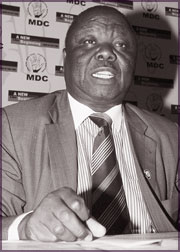
Morgan Tsvangirai |
The opposition says it won the 29 March presidential poll outright,
but results are yet to be released.
Meanwhile, a Chinese ship carrying weapons to Zimbabwe may return to
China after being blocked in South Africa.
Chinese foreign ministry spokeswoman Jiang Yu said the ship's owners
were considering bringing the arms back, amid international pressure not
to let the ship unload its cargo.
But on Tuesday the ship was located off Africa's southernmost point,
the Cape of Good Hope, and was said to be heading in a north-westerly
direction.
In a joint statement, leaders of the main religious denominations
warned against leaving the post-election deadlock unresolved.
"If nothing is done to help the people of Zimbabwe from their
predicament, we shall soon be witnessing genocide similar to that
experienced in Kenya, Rwanda, Burundi and other hotspots in Africa and
elsewhere," they said.
"We appeal to the Southern African Development Community (SADC), the
African Union and the United Nations to work towards arresting the
deteriorating political and security situation in Zimbabwe."
The opposition Movement for Democratic Change (MDC) and its leader
Morgan Tsvangirai insist they beat President Robert Mugabe's Zanu-PF
party outright in presidential and parliamentary polls.
An election recount for 23 out of 210 constituencies that had been
due to end on Monday, has been delayed for an unknown period.
The MDC has rejected the recount as illegal.
On Tuesday Mr Tsvangirai said the Zimbabwe Election Commission had
been discredited and he would not accept any run-off.
Speaking in Ghana, he appealed for help from the international
community. Zimbabwe's President Robert Mugabe has been under fire over
March's disputed elections.
His neighbours have been supportive but regional differences are now
emerging.
Next
"Robert Mugabe is a liberation hero on our continent and he must be
convinced to make a graceful exit," he said.
Mr Tsvangirai also renewed his criticism of South African President
Thabo Mbeki, who has been acting as a mediator over Zimbabwe.
"We call on President Mbeki to be bold and take this historic
opportunity to side with the people of Zimbabwe and not with any
political party," he said. The leader of the governing African National
Congress in South Africa - Jacob Zuma - has further distanced himself
from Mr Mbeki, criticising the delays in publishing the election
results.
"It's not acceptable. It's not helping the Zimbabwean people who have
gone out to... elect the kind of party and presidential candidate they
want, exercising their constitutional right," he told Reuters news
agency.
Post-election violence has displaced 3,000 people, injured 500 and
left 10 dead, according to MDC secretary general Tendai Biti.
Human rights groups say they have found camps where people are being
tortured for having voted "the wrong way".
But Zimbabwe's Justice Minister Patrick Chinamasa denied that anyone
had died in political violence.
Police spokesman Wayne Bvudzijena was reported as saying that of the
10 people reported dead, only four names had been supplied and "of these
three have no basis whatsoever while the fourth is still under
investigation and will be concluded soon".
US 'pressure'
Meanwhile the fate of the Chinese ship, the An Yue Jiang, is still
uncertain.
A spokesman at the Lloyds Marine Intelligence Unit in London said
that according to the ship's Automatic Identifying System (AIS), it was
heading up the coast of Africa, towards Angola.
BBC
Georgia accuses Russia of downing spy plane
TBILISI, Georgia -- A Russian fighter jet has shot down an unmanned
Georgian spy plane as it flew over the breakaway region of Abkhazia,
Georgia's air force commander said Monday.
The two countries' presidents discussed the incident by telephone
Monday in what Georgian leader Mikhail Saakashvili termed a "difficult
conversation."
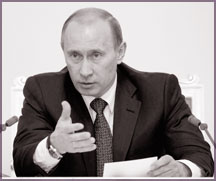
Col. David Nairashvili, Georgia's air force commander, told The
Associated Press that video footage recorded by the plane before it was
shot down Sunday shows the attacking jet to be Russian.
The footage, which was shown to AP, showed an aircraft firing a
missile in the direction of a plane and a few seconds later the screen
goes blank.
The incident occurred over Abkhazia, a region that has had de-facto
independence since breaking away from the Georgian government in the
1990s.
Nairashvili said the plane's distinctive twin-tail markings indicate
it is a MiG-29 and radar shows it took off from the Abkhazian town of
Gudauta, the former site of a Russian military base.
"It's a Russian aircraft. Georgia does not possess it, nor do Abkhaz
separatists," he said. "It's absolutely illegal for a Russian MiG-29 to
be there."
Georgia announced it had summoned Russia's ambassador to lodge a
protest. Russian Defense Ministry officials directed all comments to a
spokesman for Russia's joint chiefs of staff, Col. Alexander
Drobyshevsky, who could not be immediately located for comment.
However, the Interfax news agency quoted him as denying any
involvement by Russian air force jets, saying Sunday was a day of rest
for Russian pilots.
Abkhazian Deputy Defense Minister Garry Kupalba also disputed
Georgia's account. He said the spy plane was shot down by one of its
L-39 jets, which the Abkhazian military has several of. He accused
Georgia of violating U.N. resolutions regarding Abkhazia.
Kupalba identified the unmanned plane as an Israeli-made Hermes 450
plane and said it was identical to a Georgian one that was shot down by
Abkhazian forces on March 18. Remnants of the spy plane were found over
the Black Sea as well as the Gali district, which borders Georgia.
The TV footage provided by Georgia clearly shows a jet with twin-tail
construction -- something that makes MiG jets distinctive and makes it
impossible to confuse with the single-tail construction of the L-39.
Tensions have grown between the Abkhazia and Georgian governments
since Abkhazia in February formally appealed for the world community to
recognize it as independent. The Abkhazian parliament cited Kosovo's
declaration of independence as a precedent.
After the March 18 shoot-down, Abkhazia's president, Sergei Bagapsh,
vowed that the region's military forces would shoot down any Georgian
combat planes that fly over its territory.
Last August, Georgia said a plane coming from Russia entered the
country's airspace and dropped a missile. The missile did not explode
and no casualties were reported.
Saakashvili, the Georgian leader, has vowed to bring both Abkhazia
and another breakaway region, South Ossetia, back under central
government control.
He also cultivated strong economic and military ties with the United
States and actively sought NATO membership -- much to Russia's
consternation.
Russia, meanwhile, has tacitly backed South Ossetia and Abkhazia,
granting their residents passports and other support. Moscow recently
announced that it was establishing stronger ties with both regions.
Saakashvili termed his conversation with his Russian counterpart,
Vladimir Putin, "difficult." The two also discussed Russia's recent
moves toward the two regions.
AP
Harry Potter case brings the law into Internet Age
By Sunny Hostin
NEW YORK (CNN) -- It's a battle worthy of Harry Potter himself. His
creator, author J.K. Rowling, is locked in a courtroom fight not with an
evil wizard but with one of her biggest fans, a former librarian from
Michigan named Steven Vander Ark.

Rowling is suing to stop the publication of the "Harry Potter
Lexicon," an encyclopedia authored by Voldemort -- I mean, Vander Ark --
that Rowling claims is a wholesale theft of her work.
The encyclopedia is an offshoot of Vander Ark's long-popular fan Web
site, which details the world of Harry Potter, replete with magic
spells, potions and quidditch rules. Even Rowling has admitted that she
was a fan of the site.
"This is such a great site that I have been known to sneak into an
Internet cafe while out writing and check a fact rather than go into a
bookshop and buy a copy of Harry Potter (which is embarrassing). A Web
site for the dangerously obsessive; my natural home," she said in a
quote picked up by news organizations around the world.
Alas, she's not such a big fan anymore. Not since Vander Ark decided
to turn the Web site into a book. Under the marketing plan, the
publisher was initially to print 10,000 copies selling for $24.95,
beginning last November. (In the interest of full disclosure, Warner
Bros., which is part of CNN's corporate family, is also suing Vander
Ark.)
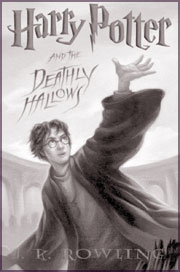
Many Potter fans are crying foul. Lynn, from Philadelphia,
Pennsylvania, commented on the Times of London's online edition: "It
seems these Web sites have promoted and publicized her works, and
followed her every move like a little puppy dog and that was fine so
long as she made the money.
She wrote a good story, but her books are hardly great works of
literature. She needs to get a life now and perhaps not be so flattered
by herself. Work on another book, have a cup of tea, move on."
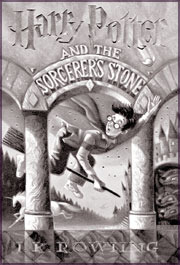
Rowling is a billionaire and Vander Ark is a mere muggle: a
librarian. The Web site Salary Wizard lists the expected salary for a
typical librarian in the United States as $53,861. But Rowling says it
is not about the money, it's about control.
"The book at the heart of this case has overstepped a boundary so
unreasonably that I have been forced, regretfully, to take legal
action," she said in a statement as she took the case into a New York
courtroom.
"If this book is published, it will open the floodgates for anyone to
lift an author's work and present it as their own," Rowling said. "But
if it is not published, that will be a boon not only to all who create
original works, but to all who enjoy those works."
Paul Callan, professor of Media Law at Seton Hall University, thinks
she has a case. He said, "I think it's a radically different situation
than a free Web site that is just there to help fans. This is a crass
attempt to make money off of the creativity of a very successful
author."
But Professor Tim Wu of Columbia University law School said Vander
Ark (and other creators of fan Web sites like the Lexicon, for that
matter) is an author in his own right. "These may not be authors like
Rowling, who are going to become millionaires. But I think, however
humble, they are they deserve a little respect, and that's where I think
the law needs to go."
Most lawyers agree -- with both professors. That is because this is
an extremely close call on the law, almost a toss-up, in my view. Even
U.S. District Court Judge Robert Patterson, who is deciding the case,
said so, urging the parties to settle. "This case is in a murky state of
the law," said Patterson. "I've listened to the parties and heard them.
I'm not sure you couldn't settle even now, if you listen to what's being
said."
So, why is this legal question so murky? Most likely, the law simply
hasn't caught up with the Internet. The Copyright Act of 1976, enacted
way before the advent of the Internet and the fan-based Web sites,
bestows copyright owners with control of their creative work. A
copyright is supposed to protect its owner, and thus, only the author
can authorize others to reproduce the work. But that right is not
unfettered, as many think. One of the more important limitations is the
doctrine of "fair use."
The law set out four factors to be considered in determining whether
a use is fair:
. The purpose and character of the use, including whether such use is
of commercial nature or is for nonprofit educational purposes.
. The nature of the copyrighted work.
. The amount and substantiality of the portion used in relation to
the copyrighted work as a whole.
. The effect of the use upon the potential market for or value of the
copyrighted work.
The distinction between what is "fair use" and copyright infringement
is unclear. And even acknowledging the source of the copyrighted
material (which the Lexicon does) is no substitute for obtaining
permission.
Permission that Vander Ark apparently did not get, but curiously
demands of those wishing to "copy" his "work."
That's right, "The Harry Potter Lexicon" has a copyright, too.
This is not a new battle. President Ford fought it 30 years ago. In
1977, he contracted with Harper & Row to publish his memoirs, "A Time to
Heal: The Autobiography of Gerald R. Ford, " a 30,000-word tome.
Of course, what was of great interest to all was a chapter discussing
why he pardoned former President Nixon. The agreement gave Harper & Row
the exclusive right to license prepublication excerpts.
In 1979 (before there was a CNN), Harper negotiated a deal with Time
magazine (now CNN coporate kin) for the right to excerpt 7,500 words on
the pardon. Shortly before the Time article's scheduled release, an
unidentified source provided The Nation magazine with the unpublished
Ford manuscript.
The Nation wrote a 2,250 word article, using at least 300 words
lifted directly from the manuscript, scooping Time. Time canceled its
article and refused to pay Harper under the contract. Harper immediately
sued The Nation, and the case went all the way to the Supreme Court.
Harper's argument? No fair! No fair use, that is.
And the Supremes agreed. So what will happen in the next chapter of
the Harry Potter legal saga? A decision in the case is not expected
until after May 9. Whatever the outcome, we could be witnessing a
precedent-setting case about creativity and control.
Sunny Hostin is a legal analyst on "American Morning."
CNN
Zardari, Nawaz hold 'inconclusive' talks:
Reinstatement of judges
by Amir Wasim
ISLAMABAD, April 21: PPP co-chairman Asif Ali Zardari and PML-N chief
Nawaz Sharif on Monday held 'inconclusive' talks to finalise a plan for
reinstatement of judges.
Informed sources told Dawn that leaders of the two coalition parties
held detailed discussion on the draft of a resolution to be tabled in
the National Assembly for reinstatement of some 60 judges of superior
courts. The meeting, which continued for more than three hours, was held
at the Punjab House.
|
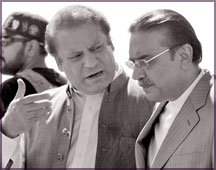
PPP co-chairman Asif Ali Zardari (R) and PML-N chief Nawaz
Sharif |
The sources said that Mr Zardari had been assisted by federal
ministers Farooq Naek, Syed Khurshid Shah, Sherry Rahman and Rahman
Malik, while Mr Sharif was accompanied by Shahbaz Sharif, Khwaja Asif,
Ahsan Iqbal, Chaudhry Nisar Ali Khan and Siddiqul Farooque.
Briefing newsmen after the talks, PML-N spokesman Siddiqul Farooque
said: "Today's talks remained inconclusive, but leaders of the two
coalition parties will meet again tomorrow (Tuesday)."He dispelled a
perception that there were differences within the coalition parties over
the issue of reinstatement of judges.
"In fact no party can afford failure of talks. It is almost
impossible for anyone to back out of the written commitment made by the
two parties in the Bhurban Declaration."
The PML-N leader said the 30-day deadline for the reinstatement of
judges would end on April 30 and the nation would soon hear good news.
He said the present session of the National Assembly could be extended
beyond April 25, if required. The sources said that Mr Zardari and Mr
Sharif had a meeting in a separate room with law minister Farooq Naek
and Petroleum Minister Khawaja Asif and discussed the draft of the
resolution for about 45 minutes.
Meanwhile, constitutional expert Justice (retd) Fakharuddin G.
Ibrahim, who had prepared the initial draft, also arrived in Islamabad
on Monday, setting off speculations that he had been called by leaders
of the two coalition parties to help finalise the draft. However,
leaders of the PPP and PML-N rejected the speculations.
They, however, did not rule out the possibility of the constitutional
expert having been invited to join the Tuesday's meeting between Mr
Zardari and Mr Sharif to give final touches to the draft resolution.
"There is a possibility that he (Justice Ibrahim) may be asked to
join the meeting," Mr Farooque said.
The sources said that although the two sides had complete
understanding on the issue of reinstating the judges through a
resolution, there were still differences on the draft of the resolution,
mode of its implementation and the strategy to deal with its possible
implications.
One major issue, the sources said, was the fate of existing judges
who had taken oath under the PCO on Nov 3 and again under the 1973
Constitution when the emergency was revoked by President Pervez
Musharraf on December 15 last year.
They said the two sides had yet to decide whether the present judges
would be asked to continue or they would be sent home. The sources said
that some PPP leaders believed that the present judges should not be
called the PCO judges as they had also taken the oath under the 1973
Constitution.
They said if the present judges were to be called the PCO judges then
deposed Chief Justice Iftikhar Mohammad Chaudhry would have to be placed
in the same category because he also had taken oath under the PCO soon
after the 1999 military takeover.
"If the present judges are allowed to function after the
reinstatement of deposed judges, then the strength of the Supreme Court
and some of the high courts would exceed the sanctioned strength," said
a PPP leader.
Dawn, Pakistan
Nepal's king denies exile reports
King Gyanendra of Nepal has dismissed reports that he will go into
exile after the election success of former Maoist rebels. A statement
from the king's press office said foreign media reports - which have
said he will leave Nepal - were "totally fabricated".
|
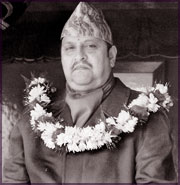
King Gyanendra |
The Maoists say their main concern is that he steps down voluntarily,
rather than being forced out of office.
The Maoists were the surprise winners of this month's elections.
The poll was for a constituent assembly that will decide Nepal's next
constitution after a decade of civil war. The Maoists have emerged
clearly as the biggest party but look like they will fall short of
gaining an overall majority.
Reports in Indian newspapers have been suggesting for some time that
King Gyanendra would go into exile there.
But a statement issued by the royal palace in Kathmandu said the
foreign press reporting was "totally fabricated and unfounded".
|
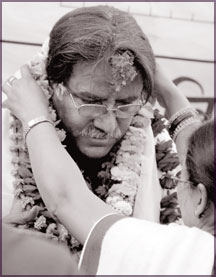
Maoist Leader Prachanda is garlanded by a supporter during a
victory rally in Kirtipur |
It gave no indication as to whether the king would step down. The
Maoists have made it clear that they will make the abolition of the
monarchy one of the first priorities of the new constituent assembly.
"It does not matter whether he lives in India or Nepal," Maoist
spokesman Krishna Bahadur Mahara told AFP news agency on Monday.
"We have already decided with the interim constitution what will be
done. We are going to declare Nepal a republic, and he will have to
accept it."
Last week Maoist leader Prachanda urged King Gyanendra to step down
from office of his own accord. "In history, monarchs have been beheaded
and also had to flee. Let that not be repeated in Nepal," Prachanda said
on state-run television.
Another key demand of the Maoists is that former fighters be
integrated into the army. They show no signs of wanting to compromise on
the issue.
"We have already decided that the two armies will be integrated and a
new security force will be created," Maoist deputy leader Baburam
Bhattarai told Reuters news agency. "A new political leadership has
come. The army should follow the political leadership." The army says
that new soldiers should only be recruited by normal methods. "The army
is an apolitical organisation," an army spokesman said.
The Maoists declared an end to 10 years of insurgency in 2006. Both
the rebels and the military were regularly accused of gross human rights
violations during the war.
Latest results from the 10 April election give the Maoists 120 of the
240 seats chosen by the first-past-the-post system. One seat has still
not been declared. A further 335 seats are allocated by proportional
representation. The Maoists now have about 30% of votes counted for
those seats. Another 26 seats will be allocated by the next government.
The US still officially classifies the Maoists as terrorists. But
Washington has congratulated the Nepalese people for holding elections
which it says were mostly peaceful.
BBC |
